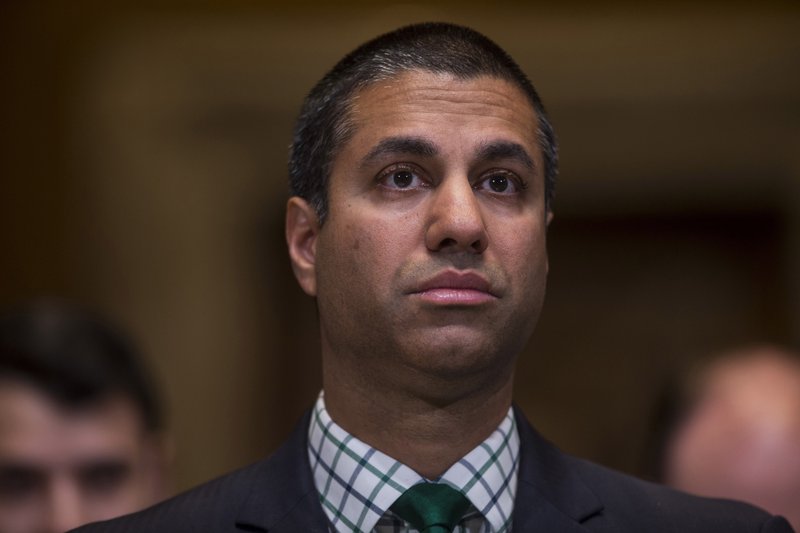The Federal Communications Commission's chairman proposed letting telephone companies block robocalls, a step that consumer groups welcomed but said wasn't enough to squelch a growing scourge that has millions of people dodging unwanted calls.
"The American people are fed up with illegal robocalls," FCC Chairman Ajit Pai said in a news conference. "We need to make it easier for phone companies to block these robocalls."
Under Pai's proposal, the FCC would step away from decades of insisting that the phone network connect nearly all calls, and move into pressuring phone companies to shield consumers from unwanted interruptions including scams and sales pitches. The changes need approval in a vote by the full commission set for June 6.
Right now, customers have to take the extra step of requesting tools from their carriers or downloading apps from other companies to help weed out most unwanted calls.
Since many robocalls are legal, it's not clear what effect Pai's order would have, said Margot Saunders, an attorney with the National Consumer Law Center.
The term "robocall" covers a wide array of calls, including such legal calls as school closing announcements, and prescription or medical appointment reminders, the FCC said. Its proposed steps are designed to thwart unwanted calls.
"As far as it goes, it's great. And whether it's enough -- I doubt it," Saunders, who works to stop unwanted calls, said in an interview. "It can't block all robocalls because obviously there's a lot of valid robocalls. It can't block all spoofed calls because the law doesn't make spoofed calls illegal."
Spoofed calls are those that display fake numbers to caller identification, making it falsely appear a call is coming from a familiar area code or prefix.
Telephone providers reacted cautiously. The Cellular Telecommunications Industry Association, a wireless trade group, in a statement from Senior Vice President Scott Bergmann said it's committed to combating illegal and unwanted robocalls, and didn't pledge new measures by its members. Companies represented by the association include the top four U.S. mobile carriers -- AT&T, Verizon Communications, T-Mobile US and Sprint.
Pai's proposal will expand providers' ability to block unlawful calls, but "there is no silver bullet in this war as scammers continue to find new ways to reach unsuspecting consumers," Joan Marsh, AT&T executive vice president, said in an emailed statement. Verizon's Senior Vice President Will Johnson in an emailed statement said the company "welcomes" Pai's announcement and is "fully committed to fighting the scourge of robocalls."
ACA International, a trade group for credit and collection companies, said it supports steps against illegal calls. "However, consumer harm results when legitimate business calls are blocked or mislabeled" leaving people without critical information, Leah Dempsey, ACA's senior counsel, said in an email.
The Federal Trade Commission, which handles the national Do Not Call Registry, took in 5.8 million complaints about unwanted calls in 2018, according to an FCC report issued in February.
The number of robocalls increased from 29 billion in 2016 to almost 48 billion in 2018, according to an estimate by cloud-based communications company YouMail Inc. cited by the FCC. The figures generally don't differentiate between legal and illegal calls, the agency said in the report. One company projects that more than four in 10 calls to mobile phones will be scam calls this year, the FCC said.
Many voice providers have held off developing and deploying call blocking tools by default because of uncertainty about whether such tools are legal under the FCC's rules, the agency said in a news release Wednesday.
Historically the FCC has allowed call blocking only in rare circumstances, placing a priority on making sure calls go through. In its February report the agency noted the availability of call-blocking apps for mobile phones. Consumer groups have called for voice service providers to offer free call-blocking tools to their customers, the agency said.
Companies offer various technologies for detecting and blocking robocalls. Some use feedback from customers to identify robocallers. Another method registers callers to numbers abandoned by consumers, since legitimate callers probably aren't trying to reach an unused line, according to a 2015 report from Consumers Union.
Under Pai's proposal, phone companies will be permitted to detect and analyze robocalls and block them from bombarding consumers' phones -- similar to the way email providers block spam, the FCC said in a fact sheet.
Information for this article was contributed by Todd Shields of Bloomberg News and by Tali Arbel of The Associated Press.
Business on 05/16/2019
